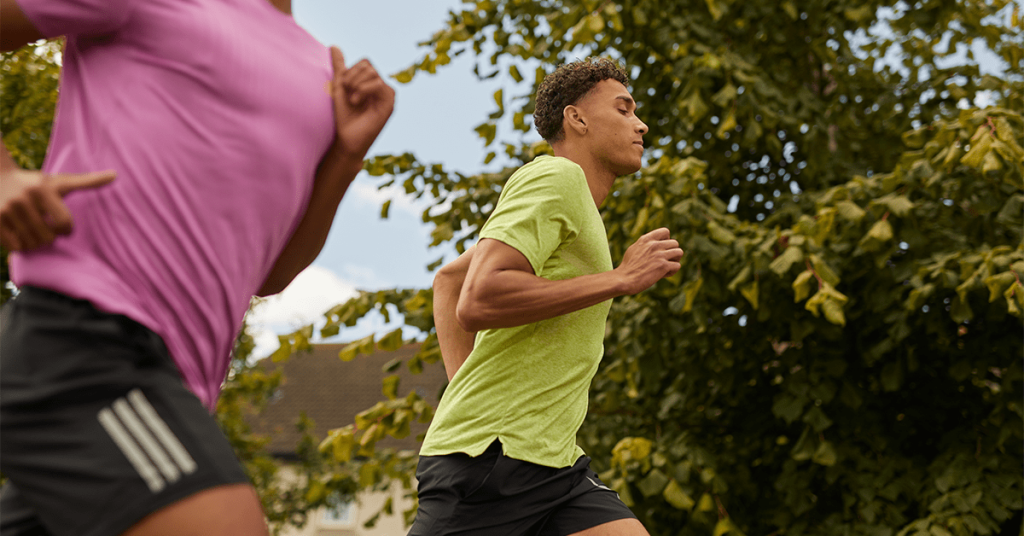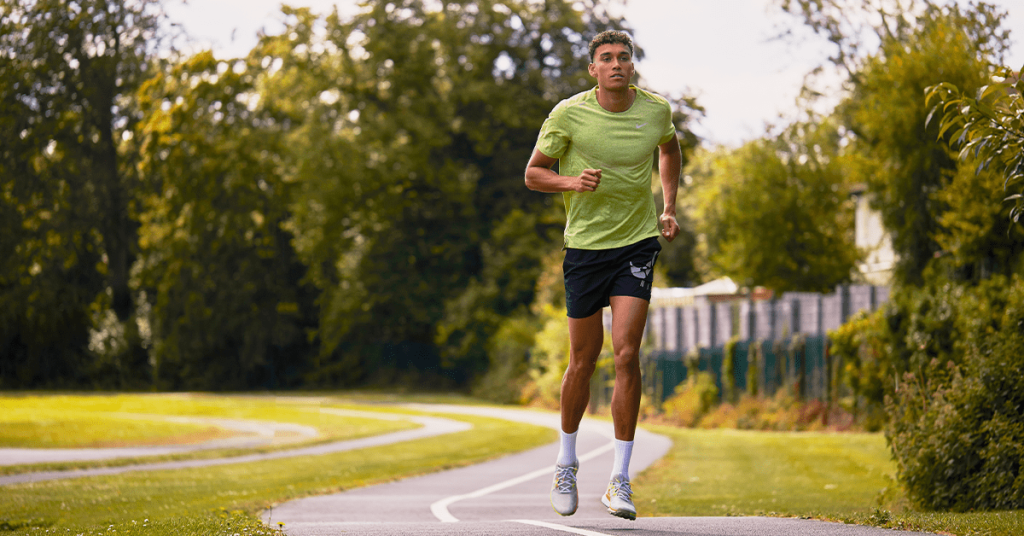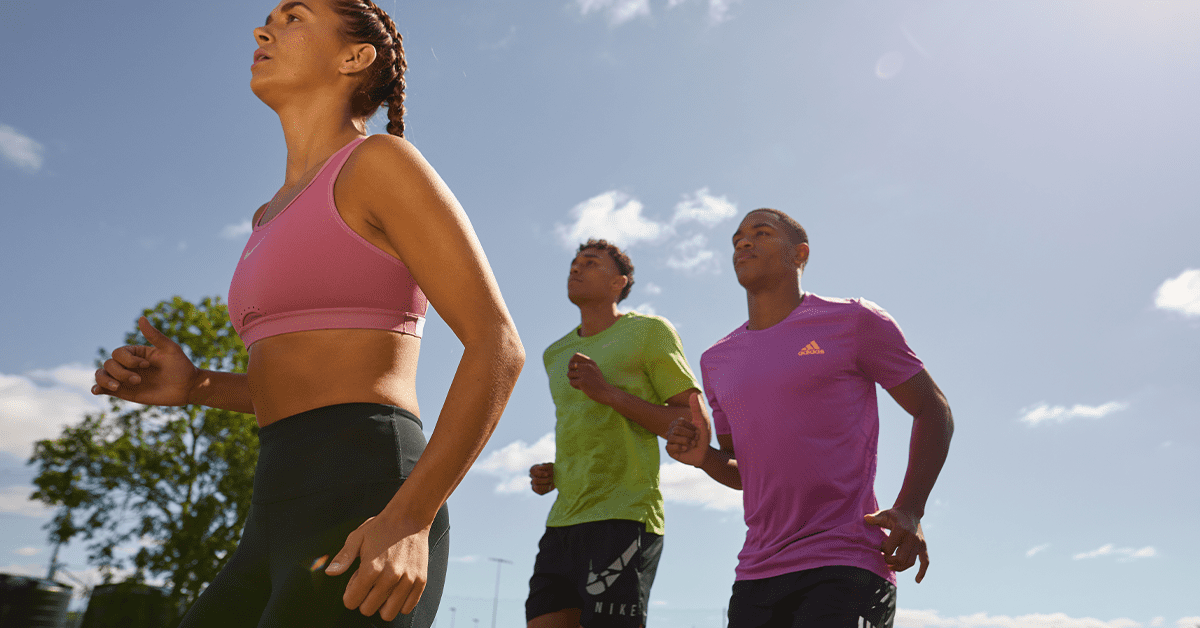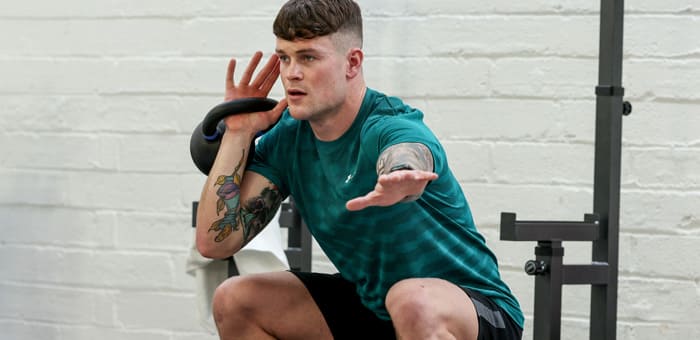On Sunday, October 30th, the Dublin Marathon 2022 will be taking place. It will be starting bright and early on Fitzwilliam Street Upper and it’s expected that over 20,000 competitors will be taking part to complete the 26.2-mile run around Ireland’s most famous city.
If you’re one of these individuals then you’ll want to make sure that your final month of training is one that gets you primed for peak performance and ready to hit the streets.
So to help, we’ve put together this comprehensive guide that gives advice on how best to train in these final four weeks including the ways in which you can boost your nutrition, how to get prepared both pre and post-race week, as well as the running equipment you might need to see you through training and race day.
4 Weeks to the Marathon? Here’s How to Train for a Marathon.
Before a marathon you need to get the right balance of exercise and rest if you want to be at an optimal level of fitness. In other words, you need to make sure you don’t push yourself too hard that you’re fatigued when race day arrives, but also that you have a routine that keeps your body in the best condition.
Below you can find our four-week marathon training routine that breaks down what you should be doing exercise and rest-wise in each of the four weeks before your race. This is available for you here to download, read and utilise.
4 Week Marathon Training Routine

4-Week Marathon Training Plan:
As you approach event day it is important that your training adapts to the needs of your event. In the final month of preparation before your event, it is vital that you begin to prepare the body against the risk of injury, whilst remaining physically prepared for the upcoming Dublin marathon.
One way to achieve this is to split the final month into two distinct sections. The first split is a continuation of your previous training with the second split being a shift to a more injury prevention-based approach to training, this can allow you some rest whilst keeping your body prepared for the upcoming event. By adopting this method your body should be both relaxed whilst also being prepared for the event.
So, the aim of the game here is to get ready for the Dublin marathon effectively whilst protecting against injury, so let’s get it!
Your Programme:
Running Activities:
Endurance – A Steady pace, perceived at 50% of your personal rate of perceived exertion.
Speed – A fast pace, perceived at 75% of your personal rate of perceived exertion.
All In – A pace at which you give it your all, perceived at 95-100% of your personal rate of perceived exertion.
Strength and Conditioning Activities:
Strength and Conditioning 1
Complete the following for every exercise, rest for 1 min between exercises, Complete as many reps as possible in 20s, rest for 10s, and repeat this process 8 times – totaling 4 mins.
- Jump Squats
- Deadlifts w. Barbell
- Shoulder Press
- Dumbell Fly
- Dumbell Jabs and Uppercuts
- Plate Russian Twists
- Rowing Machine
Strength and Conditioning 2
Complete the following for every exercise, rest for 1 min between exercises, Complete as many reps as possible in 1min, rest for 20s, and repeat this process 5 times.
- Box Jumps
- Bent over Row w. Barbell
- Military Press
- Press Ups
- Bicep Curls
- Tricep Dips
- Plank
- Stairmaster
Your Workout Routines:
| Week 1 | Activity |
|---|---|
| Day 1 | 10KM Run – Endurance Pace |
| Day 2 | S&C 2 |
| Day 3 | 2x1KM – All In Pace – Separate with 1KM at endurance pace |
| Day 4 | Rest |
| Day 5 | S&C 2 |
| Day 6 | Rest |
| Day 7 | 25KM – Endurance Pace |
| Week 2 | Activity |
|---|---|
| Day 1 | Rest |
| Day 2 | 5KM – Speed Pace |
| Day 3 | Rest |
| Day 4 | 10KM – Endurance Pace |
| Day 5 | S&C 2 |
| Day 6 | Rest |
| Day 7 | 30KM – Endurance Pace |
| Week 3 | Activity |
|---|---|
| Day 1 | Rest |
| Day 2 | 5KM – Speed Pace |
| Day 3 | Rest |
| Day 4 | 10KM – Endurance Pace |
| Day 5 | Rest |
| Day 6 | S&C 2 |
| Day 7 | Rest |
| Week 4 | Activity |
|---|---|
| Day 1 | 5KM – Speed Pace |
| Day 2 | Rest |
| Day 3 | 10KM – Endurance Pace |
| Day 4 | S&C 1 |
| Day 5 | Rest |
| Day 6 | Rest |
| Day 7 | Race day |
Active Recovery
Throughout this last month before your event, be sure to actively recover from all of your running sessions. It is vital that you prepare for your upcoming event by utilising stretches that will improve your flexibility whilst also aiding the body to continue recovery.
The main areas that will likely require your attention are the muscle groups in your legs, think quads, calves and hamstrings etc. A foam roller session or even the use of a resistance band, after your exercise, can aid the body in its recovery.
Nutrition advice for Marathon Training
It’s true that the food you eat will have a big bearing on everything from how well you get prepared for the marathon, to the effectiveness of your training and indeed your form during the event itself. As such your nutritional choices are hugely important, especially in the final few weeks before you run.
That said, you shouldn’t just prioritise one food group over another, nor should you necessarily try to eat a balance of all of them, as some are more useful at specific times. Below we’ve broken these down for you to give you a better idea of what to eat and when:
Carbohydrates
According to the experts at HealthEssentials, around 50 – 70% of your marathon training diet should be carbs. This is because healthy carbs – so things like whole grain bread, brown rice, pasta, fruits, oats, some veg and beans – basically give you the energy you need as they ‘fuel the body with glycogen’, which is a form of glucose.
This fuel is then essentially stored in your muscles to help them perform better, maintain your blood sugar levels and also speed up your recovery time. Without carbs you can feel tired and your performance will likely be much slower and more sluggish. Equally, you don’t want too many carbs as this large metabolic load on your body can make you fatigued and in the long term will see you gain weight.
Protein
Proteins are a key part of your muscle growth and your recovery. According to Healthline, this is because they are made from ‘smaller molecules called amino acids’, which then link together to repair and rebuild your muscles, making them bigger and stronger. So it’s not hard to see why these are important for your training for the Dublin Marathon.
The good sources of protein include: poultry, lean cuts of red meat, fish, eggs, cottage cheese, nuts, plain Greek yoghurt and tofu. As a rough guide, you should also look to make proteins about 25-30% of your daily intake.
Fats
Fatty food has a bit of a bad reputation, but healthy fats should – and indeed will – form part of your marathon training diet. This is because they will be found within some of the protein-rich foods you eat, particularly in fish, nuts, and oils. The advice from medical experts can vary but the National Library of Medicine states that your total fat intake should be 20-35% of your diet during your training.
It’s no secret that too many fatty foods make you unhealthy, lead to weight gain, and won’t help with your marathon training, but some experts believe fats offer several benefits for runners. Specifically, fats can be important for ‘maintaining cell membranes, cushioning joints, and insulating organs’ and they can ‘help reduce inflammation and soreness in athletes’.
Vitamins and Minerals
You will absorb important vitamins and minerals from your diet, but some are especially beneficial for your marathon training. These are:
- Calcium – from dairy products and leafy veg – can increase your bone density and boost your muscle function and blood flow.
- Vitamin D – again, mainly found in dairy products – as well as from sunshine – is needed to help your body absorb any calcium, to give you the above musculoskeletal benefits.
- Iron – good sources of iron are green vegetables and red meat, and iron is important for having an effective oxygen transfer in our blood to our muscles. An iron deficiency can leave you feeling tired and slow.
- Magnesium – is found in leafy greens, grains, seeds, and nuts and is said to help regulate blood-sugar levels and can be useful for keeping our bones strong.
- Zinc – can be found in red meat, fish, grains, and cereals and alongside protein, it helps to support energy production and muscle repair.
- B Vitamins (e.g. B-12, B-6, and Riboflavin) – have a number of uses such as red blood cell production, the synthesising of protein, and muscle repair. B vitamins can be found in red meat, grains, and vegetables.
Nutrition for Race Week – Carb-Loading
While your diet is covered for the month before the Dublin Marathon, in the final few days before the race itself you may want to consider ‘carb-loading’.
If you’re unsure what this is involves, it’s basically a strategy long-distance runners use to ‘stock up’ – so to speak – on the fuel (energy) that carbs provide for use when they tackle the 26.2 miles. It’s not an exact science and the amount you need will depend on your size and weight, but as a rule of thumb, two or three days before the marathon you should change up your food intake to be 70-80% carbs.
Here’s a little carb-loading checklist to use and follow:
- Three days before the race, switch up your diet to the *carb one and reduce your exercise by 50%.
- Two days before, increase your carb intake even more to 80-90% and don’t do any exercise.
The day before, continue to avoid exercise and have three smaller carb-heavy meals. - Three to four hours before you race have a small carb-based snack or meal.
- Don’t overdo it on race day, as the last thing you’ll want is to feel full or bloated.
- *Make sure your carbs are low in fat, e.g. pasta, rice, oats, potatoes, corn, fruit, beans and low fat yoghurt.
Supplements for Marathon Runners
Strictly speaking, there’s no real need for you to take any supplements during your marathon training, you should also only really take them following professional medical advice. After all, ‘supplements’ by their very name are just that, things that can ‘supplement’ any vitamin or nutrient deficiencies or imbalances your body might have or be exhibiting.
This is again why getting medical guidance is key, as if you’re struggling with or feeling really tired with your training it might be you need a little boost in certain areas, but this will only be confirmed with expert blood analysis. It might even simply be a case that you’re overdoing it and need to rework your exercise regime.
If it is indeed the case that you need some supplements, you may also be advised to take these at certain points of your work. Here are a few common examples of what doctors may prescribe:
Pre-workout Supplements
A supplement that is said to help protect muscles and provide added fuel and energy is Glutamine. This is a powder that can be mixed with water and taken as a drink before you start your workout.
Intra-workout Supplements
During a workout, some athletes take L-Carnitine – typically as capsules or a powder – as it is said to increase blood flow and ultimately improve how well your muscles and tissues repair post-workout. It can also supposedly burn fat.
Post-workout Supplements
BCAA – or Branched Chain Amino Acids – supplements are often get recommended to help runners, recover post-workout. They’re typically sold as capsules or powders and are for those who may have issues with fatigue, joint pain, and weakness after training. This is because they encourage muscle growth and increase protein synthesis.
Supplements for Better Recovery
Everything from Vitamin C, E, B, and D supplements, alongside others like fish oil capsules can be helpful for aiding your recovery. Again, these can be used to prevent the negative effects of a heavy training session, particularly for those preparing for marathons, such as muscle damage, soreness, and fatigue.
Race Week Supplement Advice
In the week before the Dublin Marathon – and if this has been medically approved – the best supplements to take will vary from person to person, depending on where they need a boost. In the run up to the race you’ll want to ensure your body is in the best condition possible and supplements can help to do this.
Some runners also believe that taking probiotics in the days before a marathon can be good for improving the synthesis and absorption of vitamins and minerals. It’s also said that they can support your immune system and promote faster recovery post-training and running.
The Importance of Recovery when Training for a Marathon.
Beyond supplements, there are also plenty of steps you can take to physically aid your recovery when training for a marathon. What’s more, recovery is a vital part of your development as a long-distance runner as it gives your body the opportunities to grow, heal, adapt and ultimately get stronger. It will also prevent you from getting injured or causing long-term damage.
As such, try to incorporate the following into your exercise routine if you haven’t already:
Stretching Pre-Workout
As with any exercise, before you begin you should stretch and warm up. With running, making sure your muscles are primed is also imperative and there are plenty of options for you to consider. This handy guide from Greatist lists 12 examples of pre-workout stretches that will help make sure all your core muscle groups are ready to go.
Flexibility Training for Injury Prevention
Having a degree of dynamic and static flexibility with your body is something that won’t just make you a better runner, it will also help to prevent injuries from occurring. We reccomending giving these 10 flexibility exercises from HealthifyMe a try as part of your stretching routine and you’re sure to quickly gain a better range of motion.
Post-Workout Stretching
When you’ve finished your marathon training for the day, you should end your workout with some additional stretching. These prevent your muscles and joints from tightening up and allows them to gradually warm down. Here are nine stretches to try courtesy of verywellfit.
Foam Rolling for Recovery
Medical research suggests that foam rolling after running can reduce DOMS, enhance muscular performance and alleviate fatigue. If you want to also give this a try, take a look through this guide from SELF that explains everything you need to know about foam rollers, plus some example exercises.
Race Week Recovery
While we’ve already mentioned carb-loading, having rest periods is a must during race week, as is winding down your exercise.
This again is to help get your body primed and ready for the marathon and to lower the risk of pre-race injuries. You might also want to try some of the following to support this:
Swedish Massage
Swedish massage is one of the most commonly practised types of massage and although it might be best-known for its relaxation qualities, it’s also good for runners during race week. As this guide from Secret Spa shows, the benefits of a Swedish massage include:
- Easing of muscle pain and fatigue.
- Increased blood flow around the body.
- Increased range of movement for ligaments and muscles.
- A reduction in physical stresses on the body.
Cryo-Chamber Session
‘Cryo’ or ‘cold’ therapy is also said to be a great way to aid muscle recovery. It does involve exposing your body to extreme cold temperatures – albeit in a controlled manner – so it’s not for everyone, but this guide from CryoAction explains how such sessions can lead to an ‘overall positive effect on soft body tissues’ and that they can ‘slow down muscle soreness’.
Best Equipment for a Marathon

You’ll probably have your clothing sorted for your event, but in the final part of our Dublin Marathon training guide, we’ve given you a few recommendations on the best equipment for running long-distance.
Marathon Running Shoes
Your running shoes are arguably the most important piece of equipment for your marathon training and the event itself. They provide you with the cushioning, support, and traction you need to push on and finish these challenging runs, but some trainers are of course better suited to longer distances than others.
We’ve previously put together guides that showcase the best running shoes for men and the best running shoes for women and within each, we listed some specific trainers that are ideal for marathons.
For Men
- New Balance Fresh Foam X 1080v12
- Asics Gel-Cumulus™ 24
- adidas Ultraboost 22
- PUMA Magnify Nitro
- Nike Air Zoom Vomero 16
- Nike Air Zoom Pegasus 39
For Women
Be sure to consider investing in a new pair if your current trainers aren’t up to the task or could do with freshening up. With these suggestions, you’re almost certain to notice a difference in your performance. Moreover, the higher quality cushioning from some of these trainers can be a great way to better protect your legs from impact damage.
Running Watches
Running watches can be a fantastic piece of equipment for your marathon training, particularly if you want to push yourself to a new PB. Beyond being simply a watch that sits conveniently on your wrist, most of these innovative pieces of tech offer functionality like:
- Real-time tracking of your progress.
- Monitoring of your heart rate.
- An analysis of your route including distance, elevation, location, and conditions.
- Reports on your completed runs.
- The ability to share these reports and link them to other devices.
All of these can be great motivators and can help you set realistic goals and targets with your marathon training. Many watches are available these days and they can range in price and quality, so the best thing to do is consult tech review sites like this and draw up a shortlist before you buy one.



